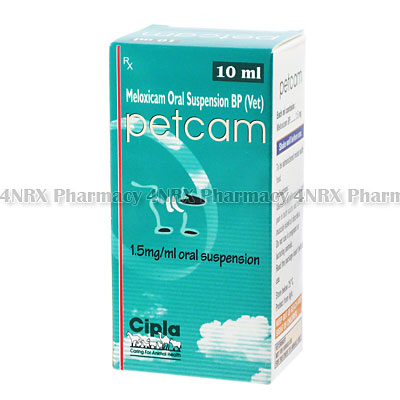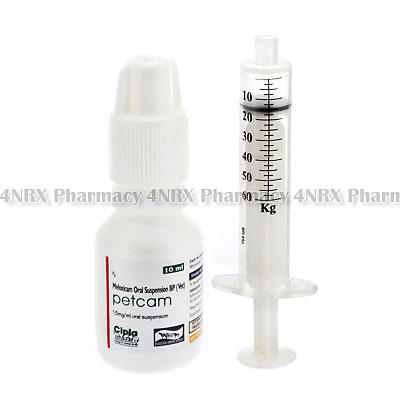 |
Home  4NRX Pet Pharmacy 4NRX Pet Pharmacy  Petcam Oral Suspension (Meloxicam) Petcam Oral Suspension (Meloxicam) |
|
|||||||||
|
Petcam Oral Suspension (Meloxicam)
What is Petcam Oral Suspension (Meloxicam) used for? Petcam Oral Suspension (Meloxicam) is a non-steroidal anti-inflammatory drug, given to dogs to relieve symptoms of osteoarthritis. This medication can help to relieve symptoms of this condition, such as pain, inflammation and stiffness of the joints, thereby helping to provide relief for the dog from its condition. How should I use Petcam Oral Suspension (Meloxicam)? Petcam Oral Suspension (Meloxicam) should be administered to the dog orally. However, you should never give it to the dog directly by mouth. Instead, carefully measured drops should be placed on the dog's food, so as to avoid the risk of overdose. To measure the solution, attach the provided syringe to the bottle, turn the bottle upside down, and pull on the plunger, filling the syringe with the correct amount of solution. It may then be administered onto the animal's food. The prescribing vet will tell you the correct dose for your dog, and how often to administer it to your dog. What are the side effects of Petcam Oral Suspension (Meloxicam)? If you administer Petcam Oral Suspension (Meloxicam) to your animal, you should observe it closely for signs of side effects, such as:
If you believe that your dog is suffering from any side effects, take it to see a vet immediately. Please Note This solution should only be administered to dogs. It should never be given to humans. Strictly follow all instructions provided to you by the prescribing vet while administering Petcam Oral Suspension (Meloxicam) to your dog. Optimum and safe dosage can differ based on the dog and the condition it is being treated for. As this medication may be unsafe for certain dogs, it is essential you always inform the vet if your dog is used for breeding and is pregnant or lactating, as well as if it has any allergies, other illnesses, or ongoing health conditions, and if it is being given any other form of medication, supplements, or herbal products. Immediately seek emergency veterinary care if your dog has any allergic or hypersensitive reaction. Common signs of a reaction in dogs include hives, swelling, skin rashes, chest pains, as well as trouble breathing or swallowing. 

|
|||||||||||||||||